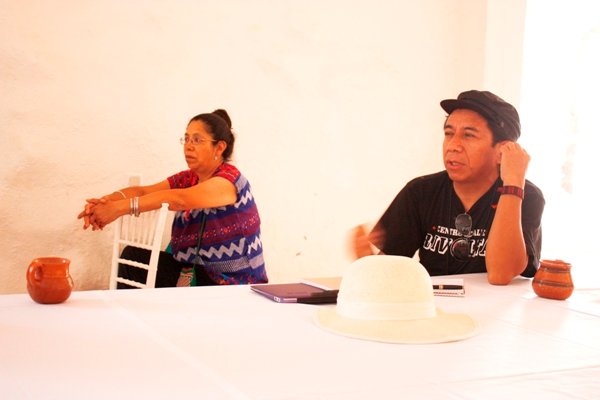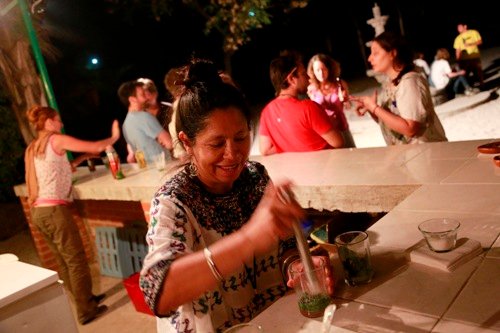


The work of authentic journalists is the most important thing for social movements
How Mercedes Osuna became a rebel with a cause
By Mayte G. Bonilla
School of Authentic Journalism, Class of 2013
August 8, 2013
Not an activist, social organizer nor a defender: Mercedes Osuna would rather define her work as human labor, something that she has dedicated an entire life to. She was born in a place were true words are heard with the heart and she lived out her convictions at a young age.
 Mercedes Osuna and the social fighter Oscar Olivera during a work session at the School of Authentic Journalism 2013 DR Clara Reina Torrijos. |
“I had to do my homework at nights so that my mother wouldn’t notice what this old lady was telling me. In her stories I discovered that inequality, oppression and racism happened everywhere. But I also discovered that there were organized peoples that had been able to change their situation. I thought it was amazing!” remembers Osuna.
At a very young age she saw the possibility for revolution in civilian organizing, just like it had happened in Cuba and the USSR.
Then she felt she could change the world. She was anxious to begin transforming the world she lived in, where originary peoples were – and still are – the most vulnerable.
That’s how Mercedes Osuna began her political education and since then she has played diverse roles in a struggle she began over 30 years ago. Since the beginning of 1980 she is part of an NGO that has accompanied social movements in Chiapas.
After the Zapatista rebellion in 1994 she was the Director of Enlace Civil of a group that monitored human rights and organized the journalists and national and international observers that arrived to Zapatista territory.
She also worked giving protection to Guatemalan refugees in Chiapas and in 2010 she travelled with migrants from Central American on their way to the United States.
Nevertheless, Mercedes Osuna believes that she lived her first political experience in 1983 when she was an Economics student at the Autonomous University of Chiapas.
“We arrived at a community of organized and very politicized people that was about two hours away from San Cristobal. The indigenous and farmers’ movement fighting to get their ancestral lands back had begun to mobilize,” tells Osuna.
“So we became part of their Assembly where we got to have a voice and could vote. We weren’t the students who had just arrived to direct things. The same community made us a part of them,” she remembers. And “they” became “us” forever.
Since then she walks with social movements and their efforts working in productive and resistance projects. These projects break with an established economic system where the powerful impose costs and always take away the profit, Mercedes explains.
She was just an 8-year-old child and already worked in her mother’s Mayan textiles shop when she rebelled against that system that wouldn’t pay what was fair to the indigenous people that travelled to sell their products. Without knowing anything about markets or economy, the little girl researched about the artisanal process to make the cloths and went on to make her own and cut out the middleman.
From community to community, that little entrepreneurial girl learnt from ancestral wisdom that indigenous women used to stain threads and sew. After that, not only did she make her own loom but she also made a skirt and sold it at a reasonable cost.
Today her taste for ceremonial huipiles – traditional dresses – is self-evident. Her thin body almost always is covered in a multicolor garment, heavy with symbolism far beyond a mere fashion statement.
“Just like women discovered agriculture, we also have a special charge: that historic memory isn’t forgotten,” says Osuna. When she says that phrase, one has to get a comfortable seat for it is the beginning of a long lesson in embroidery that weaves her cultural past that she insists must not be forgotten.
“The people that lack identity, that are already homogenized, don’t understand how their collective rights are violated,” explains Osuna. This is one of the many reasons why indigenous peoples shouldn’t lose their foundations, she insists, and then adds on a phrase from her favorite book the Mayan text “Popol Vuh”:
“They can take away our fruit, cut our branches, burn our trunk but they will never kill our roots.”
She was 14 when her mother found the publications and socialist literature that her daughter was receiving. She threw everything in the trash. So Mercedes Osuna decided to pay for her own PO Box.
“I didn’t like the oppression that we lived at my house or in my town. I didn’t like the oppression in which my community lived, I didn’t like society,” she remembers. Armed with her rebelliousness the young woman wanted to run away. But the Communist Party Manifesto found its way to her hands and that changed her mind.
“The book said that if I wanted to change society I had to start with my family,” remembers Osuna.
And so she did. Now, her octogenarian mother is her support base and her brothers and sisters are allies in the causes find good companionship in this social fighter.
 During a School of Authentic Journalism social event, Mercedes helped social directors Maia Facen and Tiberio Tinarelli mix mojitos. DR 2013 Noah Friedman-Rudovsky |
They rose up as a single force that looked to spark the flame of social change. These movements had joined the thousands of Guatemalan refugees that had arrived in Chiapas that were part of the support base of the guerrilla organizations of Guatemala.
The political movement in Chiapas was at its highest point.
“We thought we were going to have a revolution,” tells Osuna. But the revolution didn’t arrive. In its place arrived a truck full of people ready to infiltrate the organizations and start a war. In July of 1983 the repressive force of the Mexican State began a persecution under the command and counsel of the Federal Government. The plan was to finish off all leadership within the farmers, teachers, students: detained, kidnapped, tortured, disappeared, etc.
Mercedes lost companions, friends and for some time, her freedom too. The only voices that the young woman heard were those of her comrades that ratting each other out of fear or pain.
“In that moment I died to be able to live,” says the woman who assured that the best weapon in such cases is courage because “if you are afraid of them, you’ve already lost”.
And she wasn’t and still isn’t afraid. The strength of this fighter is evident when you speak to her. Her firm conviction to fight seems invincible. “But is she as tough as she looks?” I ask Al Giordano, one of her closest friends. The founder of Narco News and President of the School for Authentic Journalism answers sharply: “I will not psycho-analyze Mercedes, firstly because she would kill me and secondly because it’s not my place.”
They met in 1997 when Giordano, just like many other journalists, travelled to Chiapas to cover the Zapatista rebellion. He remembers she told him off for a mistake that endangered other colleagues.
Like for many others, Mercedes Osuna is a great teacher. Between them the term “brotherhood” surpasses anything, even the Spanish word for “trust” Mercedes explains.
The organizer and companion is part of Narco News since the end of 2005 when she became a part of the team that covered “The Other Campaign” of the Zapatista movement. And even though for Giordano it wasn’t easy talking her into it, her “sister” is now one of the strongest pillars of Narco News and the School for Authentic Journalism which she is a part of since 2010.
Aware of the important role that journalism has in social movements, Osuna spoke at a plenary session on the 24th of April 2013 before scholars and journalists that attended the school:
“When the press profits with information, the first victim tends to be truth. If the journalist doesn’t feel like a part of the movement he or she can’t speak the truth,” mentions Osuna.
“We need humanized people, sensitive people. We don’t need people that arrive just to get the story and then runs out to turn it in to their editors and hope they don’t get killed. This work that you do as journalists is the most important thing for social movements”, remarks Osuna.
Today, this active woman is still at the ready to fight. Besides sharing her experiences and knowledge in forums and plenaries she travels the world learning of other movements, like “The Indignados” in Italy.
Now she works with her NGO at the convention of the Peoples of Abya Yala, which brings together organizations of originary peoples from Panama to Chiapas.
Her vitality doesn’t seem like that of a woman of fifty something. It is hard to extract her exact age from her. Strict with the words she uses but fun and light Mercedes Osuna is still that young rebel with a cause who still a little girl at heart; a little girl that hasn’t lost her hopes for changing the world.
Lea Ud. el Artículo en Español
- The Fund for Authentic Journalism
For more Narco News, click here.




